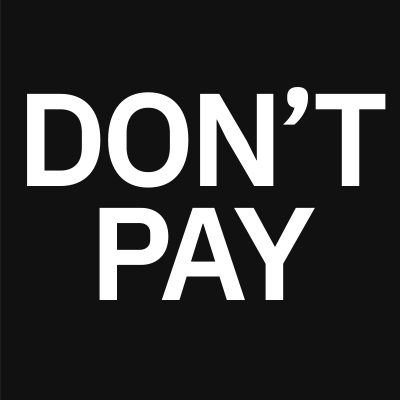
Don’t Pay is a new grassroots campaign in the UK. It offers a simple, powerful way to push back against the cost of living crisis. We'll put pressure on the energy companies, the campaign says, by getting a million people to refuse to pay their energy bills on October 1.

The organisers of Don’t Pay clearly understand activism. Their site is well written, and makes engagement simple. There's a smart ‘activist dashboard’ that shows who has pledged to join the strike so far, and where they live. You can have the campaign send out leaflets to you, or print your own.
And the organisers claim they were inspired by the leaderless, decentralised participation model that defeated Margaret Thatcher’s Poll Tax in the 1990s. So they understand the idea of best practice.
Which is why it’s confusing that their demands are so general. And that their core tactic is so ambitious. Emphasis mine:
Millions of us won’t be able to afford food and bills this winter. We cannot afford to let that happen.
We demand a reduction of bills to an affordable level. We will cancel our direct debits from Oct. 1 if we are ignored. [..]
We will gather a million people to pledge not to pay.
If you can’t measure it, everything gets fuzzy
What does reducing bills to ‘an affordable level’ look like? This figure will be different for everyone!
If I were the boss of an energy company, how could I give Don’t Pay UK what they want? Where would I start? And if I'm a potential supporter, how will I know when the campaign has won?
I don't mean to sound harsh here. By all accounts, Don’t Pay is doing well. Just six weeks after it started, the campaign is already making a media splash. It's gathered 75,000 pledges as of writing. And it's earned the honour-badge of a huffy response from the government.

It may serve as a means of gathering people affected by austerity and corporate greed, for potential future actions. It may help to shift the culture.
But if the campaign wants to make an impact, it's missing a key ingredient: an achievable demand. And it should be led by that demand – not by the tactic of getting a million people to take a risk and stop paying their bills.
Meanwhile, in Italy
Now jump to the group Last Generation. You last saw these young eco-activists gluing their hands to famous paintings in an Italian museum. Check out what they want their goverment to do (translated from Italian):
Immediately stop the reopening of disused coal-fired power plants and cancel the project of new drilling for the research and extraction of natural gas
Increase solar and wind power by at least 20GW this year and create thousands of new renewable energy jobs, helping fossil industry workers find jobs in more sustainable jobs
We will not stop until the government considers them.
Two demands for the government. Relatively easy to act on and measure. Last Generation knows what they want.
Ideas to strengthen Don't Pay
I want the Don't Pay campaign to succeed. So here are some suggestions to the organisers to sharpen it up:
Make your ultimate goal achievable
Call for deferrals of payment over the winter period. Doesn’t sound sexy enough? OK, how about: “We demand the energy companies slash bills across the UK by 40% from September to April”?
Consider other pressure points of the energy companies. Non-payment will hurt them, but there may be other soft spots you can push more easily. Legal challenges, a call-out for whistleblowers who could harm their share price, etc. (An insider can help here.)
Or target the government instead. Demand they dip into their toolbox to help: emergency reform for energy price caps, income aid, or tax reductions. In all cases, use numbers! No money for that, they say? Throw military aid figures at them (£1.5 billion for weapons to Ukraine, and rising) and press on.
Think big, but start small
This is less important, but I can't shake the idea that a million pledges across the UK will be hard to reach. Especially given the risks of non-payment like penalties, legal trouble, and getting your energy cut off. (I'd love to be wrong on this!)
So while I admit it's not headline-grabbing from the outset, consider scaling down your target for this tactic. With your specific, achievable demand, aim for a modest number in just one city. Once that works, scale it up to others. And then the country.
Starting small will make your campaign more manageable. It will show you what needs tweaking, so you can improve your actions each time the campaign scales up. If the first step is successful, you'll have a compelling pitch to potential supporters ("We already made this happen. Now we're taking it to the next level!").
And it will reduce the risk that your campaign will collapse under the weight of the expectations it has set.
* * *
TL;DR. I love the Don't Pay campaign. I value the cause. But make it achievable. And think about starting small and building it out.
Good luck.
(And if you want more on this, check out the impact method).
Update 11/11/22: Great news – Don't Pay now has some very concrete demands. I did share this piece with the campaign when I published it – I wouldn't be so presumptious as to say it helped :) but whatever the reason for the shift, it's brilliant to see, and the campaign is storming ahead. I have an interview with one of its organisers coming up in the next few weeks, and hope to share much more about how the campaign works from the inside..
So please take the above article with this context in mind, and more of an example than a reflection of that campaign specifically.
Update 02/12/22: The interview with Don't Pay is now out.


